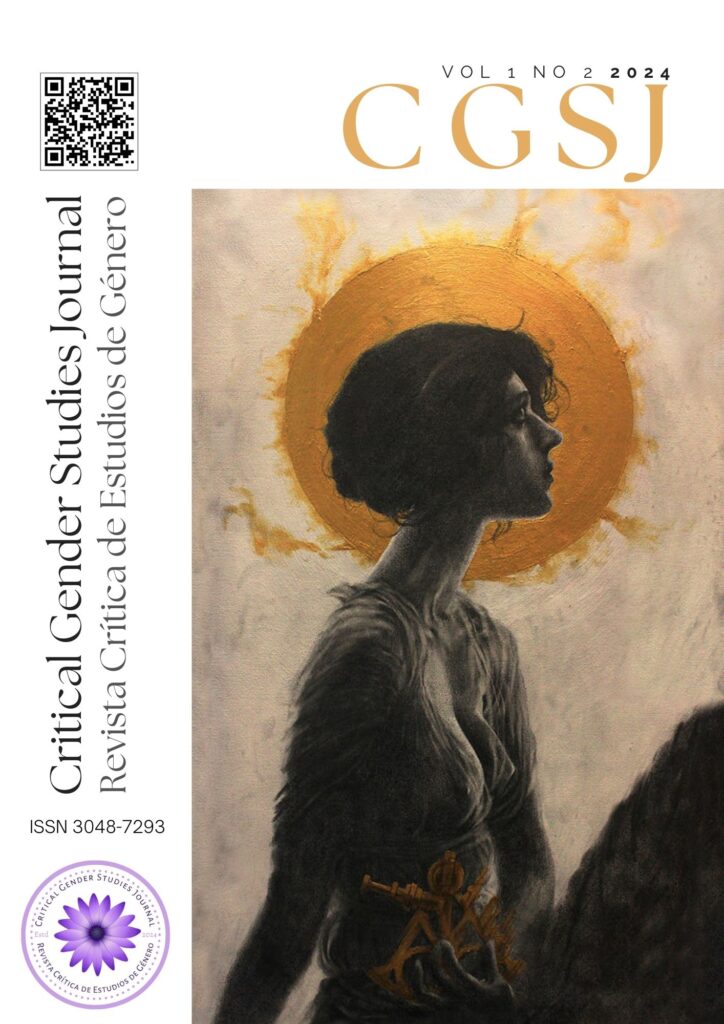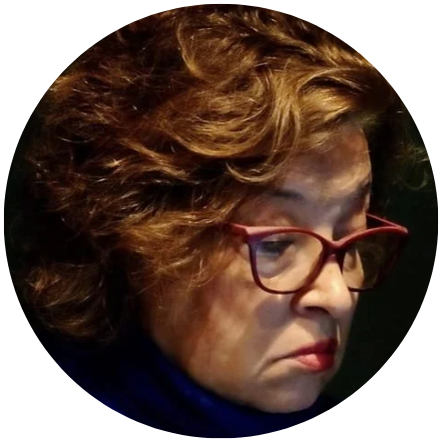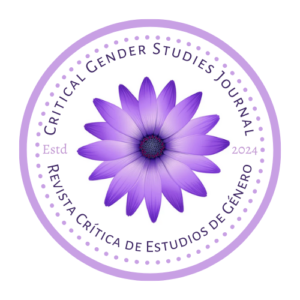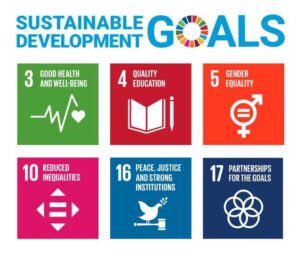A Conversation with Professor Clare Hemmings
Pragati Das
Postgraduate Department of English at Bhatter College, Dantan, West Bengal, India
| Copyright: © 2024 by the author/s. License: Critical Gender Studies Network (CGSN), India. Distributed under the terms and conditions of the Creative Commons Attribution (CC BY) license (https://creativecommons.org/licenses/by/4.0/). Publisher: Critical Gender Studies Network (CGSN) First Published: July 25, 2024. Citation: Das, P. (2024). A Conversation with Professor Clare Hemmings. Critical Gender Studies Journal. 1:2. DOI: https://doi.org/10.21659/cgsj.v1n2.01 |
The Conversation
PD: Greetings from the Critical Gender Studies Journal! We are deeply thankful for the opportunity to interview you. Your extensive contributions to feminist and queer studies, especially in areas such as transnational gender and sexuality studies, feminist epistemology and methodology, feminist theory narratives, historical imagination in feminist politics, and the theory of forms, have deep impact on academia. We thank you sincerely for sharing your expertise with our readers. We would like to start with a kind of retrospection of the making of your critical vision. What initially drew you to Gender Studies as a field of pursuit at the beginning? What were the contexts or intellectual elements that drew you to it?
CH: I came to Feminist Studies (Gender Studies is still a relatively recent term) in the late 1980s as a student of Literature. At the time, feminist literary criticism – coming out of poststructuralism – was at its giddy height, and I encountered Gayatri Spivak, Nicole Ward Jouve and Jacqueline Rose through that criticism. I then did a Masters in Women’s Studies, followed by a PhD in Women’s Studies, and have never left the field. I am particularly interested in feminist work that creates – new knowledge, new approaches, new communities – as part of interdisciplinary critical inquiry. The work I love somehow always manages that combination: of challenge and of the generation of new ideas, worlds and possibilities. And most of the work I like most emerges from a place of profound generosity rather than critique for its own sake.
PD: Who initially inspired you, maybe from your family, school, or historical figures?
CH: The women on my maternal side have been important for me: my mother and my grandmother. They are or have been strong, assertive women who moved across class boundaries. It’s never simple with family though, is it? Those women have also reproduced deep investments in men and foregrounded ‘bargaining’ over liberation in ways I both admire but have been frustrated by. My English Literature teacher in 6th form at school, Katherine Klinger, introduced me to postcolonial novels and was an early lesbian inspiration.
PD: Would you share a pivotal moment in your career that significantly influenced your research direction?
CH: I can think of three here, so I hope you’ll indulge me. As a student, I did a course on early modern literature, and wrote a final paper from a feminist perspective. The (male) professor handed it back to me with just one sentence on it: I will not be bullied into giving this paper a better grade than it deserves! That was formative for me, because I had to decide that doing feminist work would always have to be its own reward, that it would be unlikely to gain consistent (if any) institutional recognition. As an early career scholar, I was taken aback by the ‘stand-off’ between queer studies and feminist studies. I had never thought of them as separate, and it was that surprise that became the motivation for my work on Why Stories Matter, which – at least in part – challenges that opposition. More recently, the decolonising of the curriculum movement and the path-breaking work of dear colleagues and intimates to challenge white and Anglo-US authority in their own and others’ writing has really changed what I expect of myself. I have always tried to write in ways that think with and through questions of race as well as gender and sexuality, but I have been less good at decentring my own authority as a white, British thinker. I’ve been trying to do that by working collaboratively, for example, and by making more politically clear choices about where I speak, to and with whom.
PD: Your PhD thesis, Bisexual Spaces explores bisexual spaces as places defined by both geographical boundaries and cultural significance. You applied queer theory and social and cultural geography to investigate the spaces and places of bisexual life in the communities in Northampton, MA, and San Francisco. What kind of methodology did you follow or develop for conducting your research? Did your insistence on ‘methodologies’ start from this stage?
CH: Gosh, that does feel like a long time ago! But it’s true that the mixed methodological approaches that I’ve been interested in throughout my knowledge production do stem from this time. In thinking about bisexual life in the US for Bisexual Spaces, I combined autoethnography, creative writing, archival research and creation, theoretical and epistemological work, interviews, cultural and media analysis. That’s because there was very little material on bisexuality to analyse, and I need to generate quite a lot of it myself. But it’s also because I wanted to think about how bisexuality comes to make itself visible in relationship to a range of texts and contexts and that required a range of different approaches. In the end, I believe that the nature of the research work – what it is that you are trying to find out – should be the guiding principle for how you go about it.
PD: Professor Hemmings, you have worked on how the fields of feminist theory and sexuality studies have been institutionalized at national and international levels. Could you elaborate on what challenges and opportunities this institutionalization presents for contemporary feminist and queer scholarship?
CH: The institutionalisation of feminist and sexuality studies has been extremely uneven transnationally in the 50 or more years since the first courses in the emerging field were run in universities and since academic feminist journals took shape. Many of those spaces are celebrating 50-year anniversaries at the moment, for example Feminist Studies and Frontiers. These efforts have relied on the labour of collectives and individuals willing to work without recognition and usually without pay to generate feminist knowledge that endures. This is one of the marvellous legacies of the last 50 years indeed: a living archive and ongoing contexts of production and exchange. These institutional frameworks have allowed for more than theorising feminism in relationship to existing disciplines or histories of knowledge production; they have allowed for a new set of conversations both about what needs to be known, but also how knowledge circulates and how the way it is produced needs to change. That’s why feminist epistemology is so significant – it challenges not only the absence of women or of gendered knowledge, but the white male dominance that is reflected in most university and publishing contexts. Without autonomous spaces for the generation of that knowledge, one is always drawn back into early conversations about the bias of knowledge, and while that’s important, it is also frustrating. So I am a staunch and long-time advocate of feminist studies as an independent field, and worked hard to make sure that in my own context – Gender Studies at LSE – this was reflected in our becoming an autonomous department rather than centre or institute.
We need conversations about institutionalisation that recognise that we are trying to generate feminist knowledge within conditions not of our own making, though. Any survival of feminist knowledge production should be celebrated, particularly as we face increasing pressure on universities and attacks on ‘gender’ as a concept and field. Those conversations also need to be transnational and attentive to the power relations within regional and national contexts, as well as internationally. I was really fortunate in my early career to be part of the “Travelling Concepts” project (Athena),[1] that focused on trying to develop a feminist curriculum that could be taught across European contexts and that drew explicitly on multiple languages as well as contexts in its syllabi, theories and pedagogic approaches. The project started from an assessment of the presence and movement of feminist theory and pedagogy (as well as its concepts) as travelling in unequal ways and of only staying in some places and not others. What stays put and what travels; what is universalised and what is always regionalised? So, the project was a critique of the dominance of English and of Anglo-US academic feminism, and at the same time, it offered a critique of the specific local, regional and national contexts that resist the embedding of feminist thought in their curricula precisely through marking ‘Women’s Studies’ or ‘Gender Studies’ as a foreign import. That project had a big impact on me, and I’ve tried to remain attentive to the different contexts of Gender Studies – not just in Europe – throughout my career. That’s one reason why I’ve been keen to participate in teaching summer schools, in visiting scholar positions and in examining PhDs in the field from all over the world.
PD: Professor Hemmings, in your book Why Stories Matter, you investigate how feminist narratives of progress, loss, and return shape our understanding of feminist history and theory. You also emphasize the importance of realigning the “political grammar” to enable a different vision of a feminist past, present, and future. Could you elaborate on how these narratives influence the political grammar of feminist theory and how you envision “a feminist past, present, and future” within this framework?
CH: In Why Stories Matter I tried to look critically at the stories about feminist theory that circulate in English-language feminist journals as if they were self-evident. I’d noticed (in my time as a graduate student and early career scholar in the field) that the linear histories of feminist thinking (or feminism as a social movement) were told as in a kind of shorthand, as an agreed-upon prelude to whatever the main argument of the particular article was. When I looked closer at these ‘glosses’, I could see they could be broadly divided into narratives of ‘progress’, ‘loss’ or ‘return’. In a progress story, the present is a sophisticated place from which to look back at successful challenges to essentialism or blunt identity politics; in a loss story, the present is one in which feminist solidarity and politics have been displaced by marginal concerns, or fragmentations and co-optations; and in a return story (closely linked to the loss story), the proposed alternative is to go back to saner times and clearer politics. I focused on English-language journals from the UK, the US, Australia and Scandinavia in this work, to get a feel for the ways that these dominant sites of feminist knowledge production produce these stories in overlapping ways. The journals – e.g. Signs, Feminist Review, Feminist Theory, Nora – are all international in scope, and prioritise transnational production to a greater or lesser degree, but they also mark the limits of the study.
Yet while there were different understandings of ‘what happened’, they were presented in a similar way, with similar certainty, and with similar pivotal moments or building blocks. The 1970s are consistently presented as an era of essentialism or of solidarity; the 1980s are consistently presented as a decade of identity critiques (sexual or racial) or of fragmentation; the 1990s and on are presented as inclusive or myopic depending on the nature of the narrative. The author of these representations is at once heroine (whether celebrated or mis-understood) and critic, and feminist thinking will always be improved with her (us) at the centre. Such is the nature of narrative and linear history, of course, but what I wanted to point to was the politics of these stories, in order to increase accountability for them. Within feminist thinking, stories of progress, loss and return all tell a story in which black and lesbian feminisms belong to particular decades and to the past, for example; and all three stories separate out poststructuralism and queer feminisms from their feminist antecedents.
These progress, loss and return narratives also circulate outside of feminist theory, mirroring the limitations that arise from a singular story and teleology. For example, a progress narrative underpins the argument that inequality has been largely alleviated in Western contexts, but continues unfettered in other parts of the world: those contexts will only become fully modern in feminist terms, the story goes, when they adopt familiar Western frames. One effect of this narrative, and a reason to be incredibly cautious, is that it provides an alibi not only for continued stereotyping of ‘other’ countries, cultures and religions as patriarchally saturated, but also for violent intervention. But loss (and return) narratives also circulate more broadly, for example in the trenchant feminist critique of neoliberal feminisms or of global capitalism’s reach. There is a under-theorised fantasy of a lost era of unified socialist or feminist solidarity here that tends to blame either identity politics or the fortunes of a global elite for what is framed as the obliteration of alternatives. I am more sympathetic to the loss narratives here, and to their call for a return to trenchant critique of class as well as gender and racial inequality, but I am also wary of their need for the wound (as Wendy Brown might say[2]), and their own writing out of the complexity of feminism and other social movements. Narratives of progress, loss and return, then, prevent the assessment of feminism as a complex, ongoing set of struggles, weakening its power and aligning it with right-wing fantasies and left-wing laments.
Recently, I’ve been thinking about the ongoing relevance of this analysis of feminist narratives, and I do think it still holds. Progress narratives still look with scorn at ‘less sophisticated’ accounts of the world, and continue to point to mainstream feminisms as problematic (femonationalists have joined the group now); loss narratives are adamant that the essence they promote has been sidelined, even in the face of quite broad acceptance of anti-trans positions in public life (in the UK and also in many other “anti-gender” contexts). Return narratives are perhaps more shared now, though, with intersectional feminism being a favoured antidote for progress narrators, and ‘common sense’ sexual difference approaches being framed as a scientific antidote. Where exactly socialist or Marxist feminism now finds itself is less clear, though. My own feeling is that there is still important work to be done to foreground contests over meaning as a political feminist imperative. I am beginning new work that seeks to track the different histories of ‘sex’ for feminism, for example, and that explores different methodologies for countering simplistic them/us approaches that always fall short of radical transformation.
PD: Professor Hemmings, moving on to the next question, in your book Considering Emma Goldman, you explore the concept of political ambivalence through Goldman’s life and work. Could you elaborate on how this ambivalence shapes contemporary feminist praxis and why it is crucial for feminist historiography?
CH: One of the problems that I was left with after Why Stories Matter and that I wanted to work more on was who is cited as part of feminist history and who is not (following on from my development of the methodology of ‘recitation’). I’d always been interested in Emma Goldman, the anarchist author and activist (1869-1940), and was intrigued by feminist criticism that either dismissed her for not being feminist enough (she was scathing of first wave feminists), or tried to rehabilitate her as a feminist despite her rejection of the label. I wanted to go back to Goldman and work with her struggles over how to integrate an analysis of sexism into anarchism without needing to ‘rehabilitate’ her first. Partly, too, I wanted to explore the mechanisms of selection that allow secondary critics to embrace or dismiss a particular figure, and how they are made malleable for our own ends. I chose Goldman for this work precisely because she did not identify as a feminist (and spent her lifetime challenging misogyny), and because she is a complex thinker and character who I attached to from an early point in my life. I wanted to think with as well as about Goldman as a character whose ambivalence about feminism I am already staked in.
A feminist politics of ambivalence is, in some ways, a methodological as well as epistemological response to the problems of linear stories of feminist theory that had preoccupied me in my writing up to the work on Goldman. It’s a way of returning to that question of how to tell stories differently, if you like. In working with and on Goldman, I was struck by her profound ambivalence about questions of sexual politics, of gender and racial equality. She often thought more than one thing, contradicted herself or her position, and held views that chime dissonantly to a contemporary feminist ear. Rather than trying to ‘sort through’ these different views to establish which ones are fit for translation into my own contemporary context and concerns, I wanted to think about how to retain that complexity and ambivalence. How might we bring forward that ambivalence as helpful precisely because it can’t answer current questions or put uncertainty to rest, but because it foregrounds the live unresolvable nature of debates about how to ameliorate (or what constitutes) inequality? Methodologically, I wanted to showcase that if Goldman’s ambivalence is left to thrive, our own drive to resolve problems in feminist thinking through progress, loss and return narratives (that are always so certain) might be interrupted. The epistemological angle is that there cannot be a ‘right’ position with respect to sexuality, class, gender or race, and that struggles to alleviate sexism, class divisions, racism or heteronormativity need to recognise the ambivalence that characterises both our objects of inquiry and the nature of intersecting fields.
PD: What role do archives play in your research, particularly in your work on Emma Goldman? Did you develop your own methodology for archival analysis?
CH: In the work on Goldman, I made a distinction between the different archives that I drew on. In part this is because contemporary debates concerning archives, particularly from a queer, feminist and/or decolonial perspective take the archive as a partial site for engagement, one that can and must be supplemented, and one whose absences and silences also cannot be rectified simply through additions, through setting the record straight (as Anjali Arondekar might put it). The archive is both a living site, and also one that needs creative engagement. The subjective archive here, then, is the work by Goldman herself: her writings – published and unpublished – her letters and letters to her, the archival detail of her life and work (personal, governmental and so on). The critical archive is the work that people engaging with Goldman (either when she was alive or since then) have produced. I think of this as a separate archive precisely because this is where the fight over what meanings to attribute to her own archive takes place. And it’s particularly important when we’re thinking about feminism and the attempt to ‘capture’ or ‘deny’ Goldman that label. The theoretical archive is the work in feminist, queer and decolonial thinking that I am staked in and want to intervene in; it’s the place I call home and whose myopias as well as (I hope) possibilities I reproduce and participate in. There’s a fourth archive in this project, too, and that’s the ‘imaginative archive’. That’s the range of possibilities that sit around the edges of the formal archives, or are buried within it, like ghosts struggling to surface. That aspect has been hugely important for this project because there are so many areas of silence around Goldman and her life and work: we know, for example, that she gave lectures on homosexuality, but none of these has been archived; we know that she had an affair with Almeda Sperry (a fellow activist) but Goldman’s own letters have been lost. So, an engagement with the imaginative archive allowed me to think with these edges and burial sites and to write creatively back to the archive’s gaps rather than sitting with (or in) their absence.
Methodologically, the imaginative archive is probably the part of the work that needed the most thinking through, as the other archival approaches would be more familiar as constituting ‘the archive of Emma Goldman’, even if people wouldn’t necessarily divide them up in the way I did here. Thinking about the importance of creative imagination and archiving – when there isn’t so much material to go with, for example – is a central technique for queer, feminist and black archiving, precisely because of the consistent erasure of histories of marginal lives and communities. It opens up the possibility of moving beyond the constraints of description (often surveillance) and absence.
PD: Do you plan to conduct similar archival research on other historical/literary figures?
CH: Not for the moment! I wanted to track the impact of Emma Goldman for specific reasons – to look at the investments of the present and to track ambivalence as central to a vibrant feminist project – and I’m not sure I’d want to do that again with a different figure. Though of course that might change!
PD: How do you approach the intersectionality of race, gender, and sexuality in your work? How is it important for your research?
CH: I try in my work to attend to the complexities of location (of subject and object) and of the travels and translatability (or lack thereof) of particular concepts and methods. ‘Gender’ as a term already has a history, comes out of particular debates, settles or moves across different locations and disciplines. It can be used to refer to ‘sex’ as we know, but it can also be used to deflect attention away from ‘other’ categories or forms of analysis (it can substitute for ‘race’, it can be used to index sexual violence and so on). So even the term ‘gender’ is bursting at the seams with its own histories, contexts, fantasies and movements. I prefer to think about terms in that way – as dense sites of contest – than about ‘intersectionality’ as such. The term is an important one, emerging as it does out of the work of black feminist scholars and activists, but it can easily be mobilised in ways that retain a rather straightforward understanding of each category – race, sexuality, gender – as though these were discrete, simple and knowable. But having said that, I am suspicious of (and bored by) work that thinks gender = women or that race = black or that sexuality = queerness. And that’s not only because that’s not true, but also because it reveals a political investment in maleness, in whiteness or in heterosexuality as unmarked. That doesn’t answer your question, but perhaps another way of answering it is to say that I struggle in all my work to try and make sense of the histories and contexts that let us think about these categories as separate in the first place.
PD: Professor Hemmings, your current project, ‘Inheritance: a Memory Archive,’ examines themes of gender, sexuality, class transition, and nation through family histories. How do these themes intersect in your work, and what insights do you hope to uncover through this exploration? Would you suggest the methodology for undertaking similar projects in other places like India?
CH: Inheritance: a Memory Archive works with what I describe as my immediate family’s “memory archive” to tell different stories about gender, class and national belonging than those we are typically presented with. In earlier work on storytelling and feminist theory, as I hope I’ve describe a bit already, I sought to map – and then interrupt – the dominant narratives of progress, loss and return that in my view restrict the possibilities for innovation and political transformation in the field. The part of that work I enjoyed the most was the work on creative ‘recitation’, that allowed me to experiment with different plausible citation tracks for feminist stories to tell different histories. And I carried that forward in my interest in fictional letter writing as a response to the erasures in the Goldman archive. So I’ve been using fiction as a way of writing back to dominant narratives for some time. Out of the speculative interventions into both the archive and our accounts of it I’ve been steered towards this “memory archive” work that brings together storytelling and family archives. That combination allows me to to explore these abiding interests in the fissures and contradictions that make up the gendered, sexual, classed and racialised plots that are my complex inheritance.
It is the intersubjective nature of history – and the ways that stories shared within families make the relational character of history plain – that attracts me to this archival work. As a queer feminist subject still looking for pasts, presents and futures that are liveable, that challenge as well as cherish what remains, that intersubjectivity is key. Hearing, as we all do, competing stories about our own lives and those of our families, means that we learn ways of navigating the differences among them from the start. A “memory archive” then foregrounds the subjective and desiring nature of adjudication – which story one settles with or embellishes – as at the heart of how history is experienced and embodied in the present. This is an important aspect of my turn to family stories, because it highlights the skills that we learn early on in our lives to make sense of past and present, skills that are methodologically core to any process of imagining a future as different from the present we currently inhabit. Hirsch’s work on generational transmission is instructive here: she invites us to embrace family memoir and storytelling as deeply affective forms of connection and disconnection that have the capacity to make rather than only respond to history.[3]
I’ve published a couple of pieces from this project already: one on class transition, colonial histories and remembering the family past, and one on queering genre and the memory archive, which I’m excited about.[4]
PD: Professor Hemmings, the project, “Transnational ‘Anti-Gender’ Movements and Resistance: Narratives and Interventions”, by you and Sumi Madhok, effectively counters ‘anti-gender’ rhetoric and agenda. Scholars worldwide can empathize with these issues, especially given how terms like ‘feminist’ and ‘feminism’ are often used pejoratively by right-wing groups in India. Your project looks into the narrative building blocks of ‘anti-gender ideology’ and the political struggles and solidarities in resistance. Could you elaborate on the specific methodologies and approaches your team has employed to map these narratives and how these methodologies contribute to developing robust tools for resisting anti-feminist and right-wing agendas?
CH: Recent work I’ve been involved in on the rise of “anti-gender” movements transnationally, along with my colleague Sumi Madhok at LSE, has been interested in tracking the narratives, concepts and affects that allow for “anti-gender” arguments to be persuasive, to be popular. It’s been frustrating and difficult work, because it has made us very visible in moments where the hostile environment of the UK has been targeting people defending migrant and trans rights, feminist and queer rights, and critical race and intersectional approaches to knowledge. We started with bringing together academics and activists from different parts of the world to join our Advisory Committee, so that we could have a genuinely transnational approach, and also to be able to provide solidarity to people engaging in this work in their own contexts without much support. And we held a sequence of events where we invited people to explore the narratives and tropes under-pinning “anti-gender” work transnationally or in specific contexts. What we found was that these movements are becoming increasingly central to state repression (that’s certainly the case in India, Brazil, the US and Hungary), and that they cut across right and left as well. We identified common methods that underpin “anti-gender” claims such as the pitting of women’s against trans* rights, the demonization of feminism as having “gone too far” and challenging family and nation, the pathologisation of a range of “anti-gender” targets as perverse, and so on. It’s been helpful to see these recurrent tropes and to be able to historicise them – because of course, while “anti-gender” movements have a specific new form, the narratives and affects they rely on have been around a long time.
PD: In your project, “Unnatural Feelings: Anti-Gender and the Right,” you explore the role of affect in anti-gender mobilizations. Could you elaborate on how affective responses are instrumental in the success of these movements and what implications this has for countering such ideologies? We would like to know your concept of “affective temporality” also.
CH: I’ve always thought of feminism as a dense site of feeling, along with other authors like Sara Ahmed and Robyn Wiegman.[5] Like them, I’m interested in generating histories of feminism that pay attention to feelings as well as actions and words (and the interactions between and among these). And those feelings might be both within and outside of feminism – for example, the feelings of injustice that motivate much feminist resistance work, and the feelings of solidarity that keep us doing it. So that’s the context that my piece “Unnatural Feelings” came out of: it sought to examine the appeal to common sense understandings of “sex” that the Right makes, and its manipulation of feelings of marginalisation. I’ve been interested in the way that those appeals allow for that manipulation, so that ‘feeling marginalised’ (whether you are or are not), becomes an alibi for violence from the position of claimed victimhood. Those affects are very familiar, sadly also within feminism, and relate to historical tropes such as ‘white women’s vulnerability’, which can be mobilised to make anti-trans or anti-migrant actors into defenders of women rather than aggressors. I’ve also written a piece more recently on this called ‘We Thought We’d Already Won that Argument’[6] which explores the feelings of disappointment or despair that accompany the fracturing of feminism in the face of anti-trans* arguments, and the hopelessness in the face of the rolling back of reproductive and sexual rights transnationally. I don’t think we can understand any of these phenomena without attending to their affects, to be honest.
PD: We see that you run a course titled “Archival Interventions: Feminist, Queer, and Decolonial Approaches,” which includes the recommended reading For the Record: On Sexuality and the Colonial Archive in India by Anjali Arondekar. How do the colonial conditions—the complexities of colonial governance and its impact on the construction of sexual identities in late colonial India—relate to decolonization in contemporary India, particularly within the field of Gender Studies?
CH: I love this course: it’s for graduate students only, and foregrounds the importance of archival methods for drawing ambivalences and buried treasures out of dominant, hierarchical histories. Anjali Arondekar’s work is key for developing a reading practice that sees anti-colonial meaning within rather than outside of colonial texts (particularly with respect to sexuality). Arondekar’s work resonates with Gayatri Spivak’s on reading in the margins of dominant texts, and Rona Sela’s on resignifying Palestine representation from within the heart of Israel military archives.[7] Arondekar’s work on queering archives has continued in her more recent work on the abundance (too much not too little) of resistance, which is really interesting in a contemporary context of over-saturation.[8] Rahul Rao’s work on the ways in which archival traces are helpful for thinking about intervening in post-colonial states’ aggression is really worth looking at too; it’s particularly helpful for thinking about what the past tells us about the present and vice versa.[9]
PD: What advice would you give young scholars entering the field of gender studies? Would you suggest some emerging trends or fields to work on?
CH: I’ve always really enjoyed working with young scholars, and see this as central to maintaining the field of Gender Studies as a vibrant, intersubjective space of care and accountability. I wouldn’t ever suggest a particular approach, though, because I see knowledge as framed through necessity rather than popularity or critical mass. But what I would advocate is that we all engage with research tools and theories for a reason; i.e. that we have something in mind that we want to discover, or intervene in, or change. That might mean thinking with existing approaches or developing new ones. That way the approaches one takes on are situated in the politics of knowledge production, and the impulse to work in a certain way guides the choice of thinkers and areas. One piece of advice I would always give is that the work you do needs to be joyful at some level – either because the work itself feels valuable, or because the techniques, methods, or associations the work entails generate value. In these times of increasing attacks on universities this insistence that the work generates its own value is really important.
PD: Professor Hemmings, the Sustainable Development Goals (SDGs) include a vision of achieving gender equality and ending gender discrimination, particularly highlighted in SDG 5. However, we find that, as per the UN report, it will take 300 years to end child marriage, 286 years to close gaps in legal protection and remove discriminatory laws, and 140 years to achieve equal representation in leadership in the workplace. How would you react to this dystopic state of affairs globally?
CH: Truly, the state of inequality globally is heart breaking. Perhaps all one can really do when the forces of inequality (always) seem so much more powerful than the forces of resistance is to keep going. We can leave knowledge that tells a different set of stories about life and value; we can engage with one another in ways that make real different ethics of relationships; and we can try and ensure that our thinking and work nurtures others and generates spaces where difference can be acknowledged and folded into our practices. The people whose capacities to endure I most respect are people who act ethically in the world despite knowing that these are drops in oceans, who know that the basis of feminist political responsibility is not the likely outcome but the relationships it fosters and the hierarchies it refuses. Easier said than done, right?
PD: Lastly, we have just launched our Critical Gender Studies Journal. We are inclusive in our approach. Our current focus is to bring neglected voices from different parts of the world to light, and we look forward to promoting new voices. We would be happy to get your suggestions on how the journal should function as a site of productive publication. What policies should we formulate, and what areas of research need to be prioritized?
CH: I did work as part of the collective editorial group for Feminist Review journal for about 10 years, and learned such a lot from that context. One thing I would say is that generating a collective environment takes an enormous amount of time and energy, and so it has to feel worth it. In other words, it is not only the work of the journal itself (editing, publishing and so on) that needs to feel valuable; the working together and the generation of a feminist environment also need to feel nourishing in order to be sustainable. In terms of areas of interest, thinking with and through transnational connections – always, but at the moment urgently, in the face of genocide in Palestine, conflict and violence in so many parts of the world, and anti-feminist and anti-LGBTQ movements internationally – is probably the most significant way that feminist publishing can intervene in contemporary politics. It has a different temporality to activism per se, of course, and so needs to generate a focus on transnational theory, politics and methods that help us think about how to enact solidarities.
It’s an amazing project to embark upon, and I am so happy that you are doing it: thank you!
PD: Thank you so much!
[1] ATHENA was the Advanced Thematic Network in Activities in Women’s Studies in Europe (1996-2009), which brought together people working in the field annually to develop research and teaching resources. The network acknowledged the uneven nature of the field’s institutionalization in Europe, the problems of English-language dominance and provided a site to challenge white presumption in European knowledge-production.
[2] Wendy Brown, States of Injury: Power and Freedom in Late Modernity (New Jersey: Princeton UP, 1995).
[3] Marianne Hirsch, “The Generation of Postmemory’,” Poetics Today 29, no. 1 (2008): 103-28; and Marianne Hirsch, Family Frames: Photography, Narrative and Postmemory (Cambridge, MA: Harvard University Press, 1997).
[4] Clare Hemmings, “‘We Thought She Was a Witch’: Gender, Class and Whiteness in the Familial ‘Memory Archive’”, Memory Studies, Vol. 16, No. 2, 2023; ‘The Genre of Inheritance: Dancing With Grandma’, Stefan Gerson, ed, Scholars and Their Kin (University of Chicago Press, 2025).
[5] Sara Ahmed, The Cultural Politics of Emotions (London: Routledge, 2004); Robyn Wiegman, Object Lessons (Durham, NC: Duke University Press, 2012).
[6] Clare Hemmings, “’But I Thought We’d Already Won That Argument!’ ‘Anti-Gender’ Mobilizations, Affect and Temporality,” Feminist Studies, Vol. 48, No. 3, 2022: 594-615.
[7] Rona Sela “Ghosts in the Archive: The Palestinian Villages and Decolonial Archives,” GeoJournal (2021): https://doi.org/10.1007/s10708-020-10364-4
[8] Anjali Arondekar, “In the Absence of Reliable Ghosts: Sexuality, Historiography, South Asia,” Differences 25.3 (2014): 98-122.
[9] Rahul Rao, “Re-membering Mwanga: Same-sex Intimacy, Memory and Belonging in Postcolonial Uganda, Journal of Eastern African Studies, 9:1 (2015), 1-19.
 Pragati Das is a faculty member of the Postgraduate Department of English at Bhatter College, Dantan, West Bengal, India. She oversees academic relations and research for the Rupkatha Journal on Interdisciplinary Studies in Humanities and is the Convenor of the Critical Gender Studies Network. Her areas of interest include critical gender studies, Western rock music, and technology and cultural productions. Pragati Das is a faculty member of the Postgraduate Department of English at Bhatter College, Dantan, West Bengal, India. She oversees academic relations and research for the Rupkatha Journal on Interdisciplinary Studies in Humanities and is the Convenor of the Critical Gender Studies Network. Her areas of interest include critical gender studies, Western rock music, and technology and cultural productions. |







